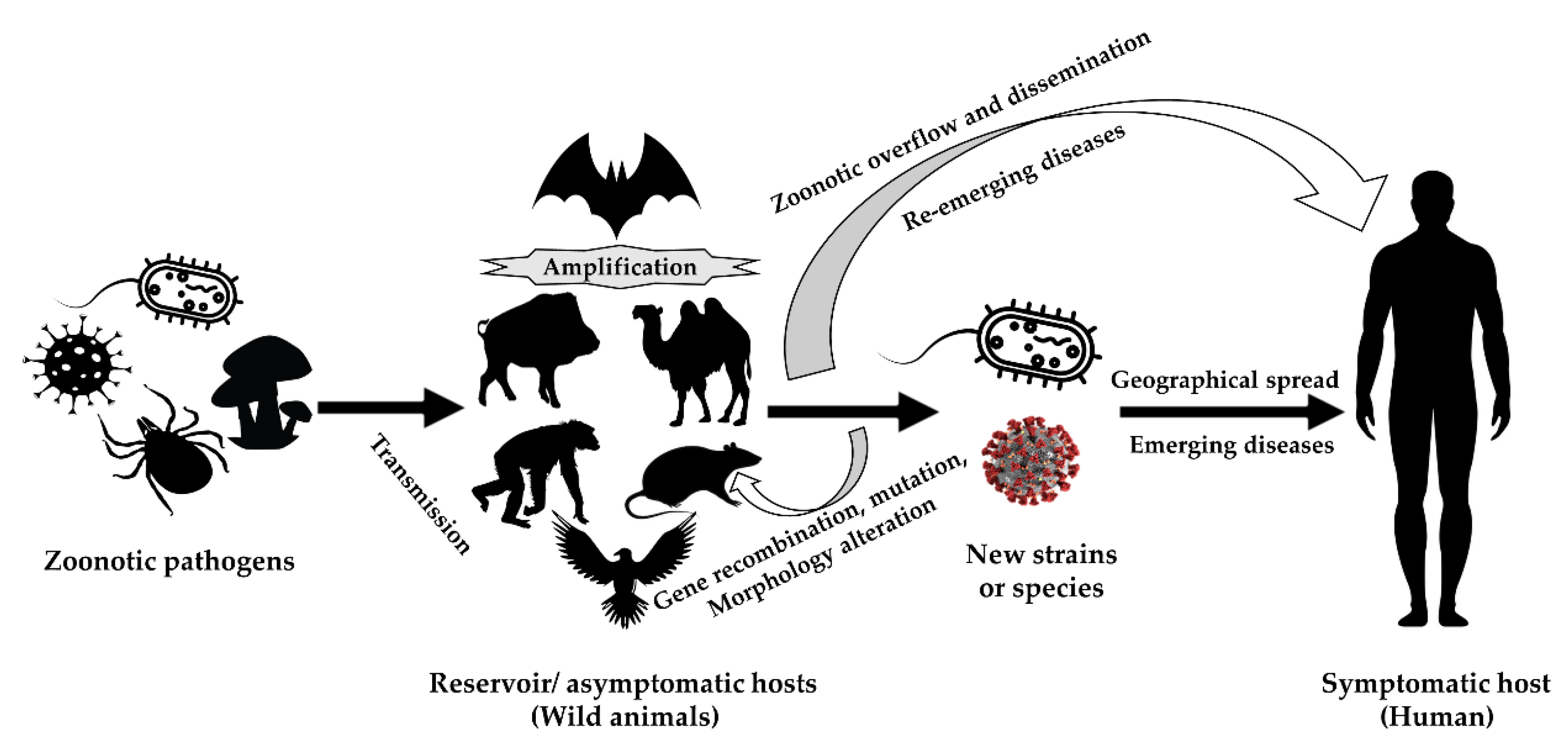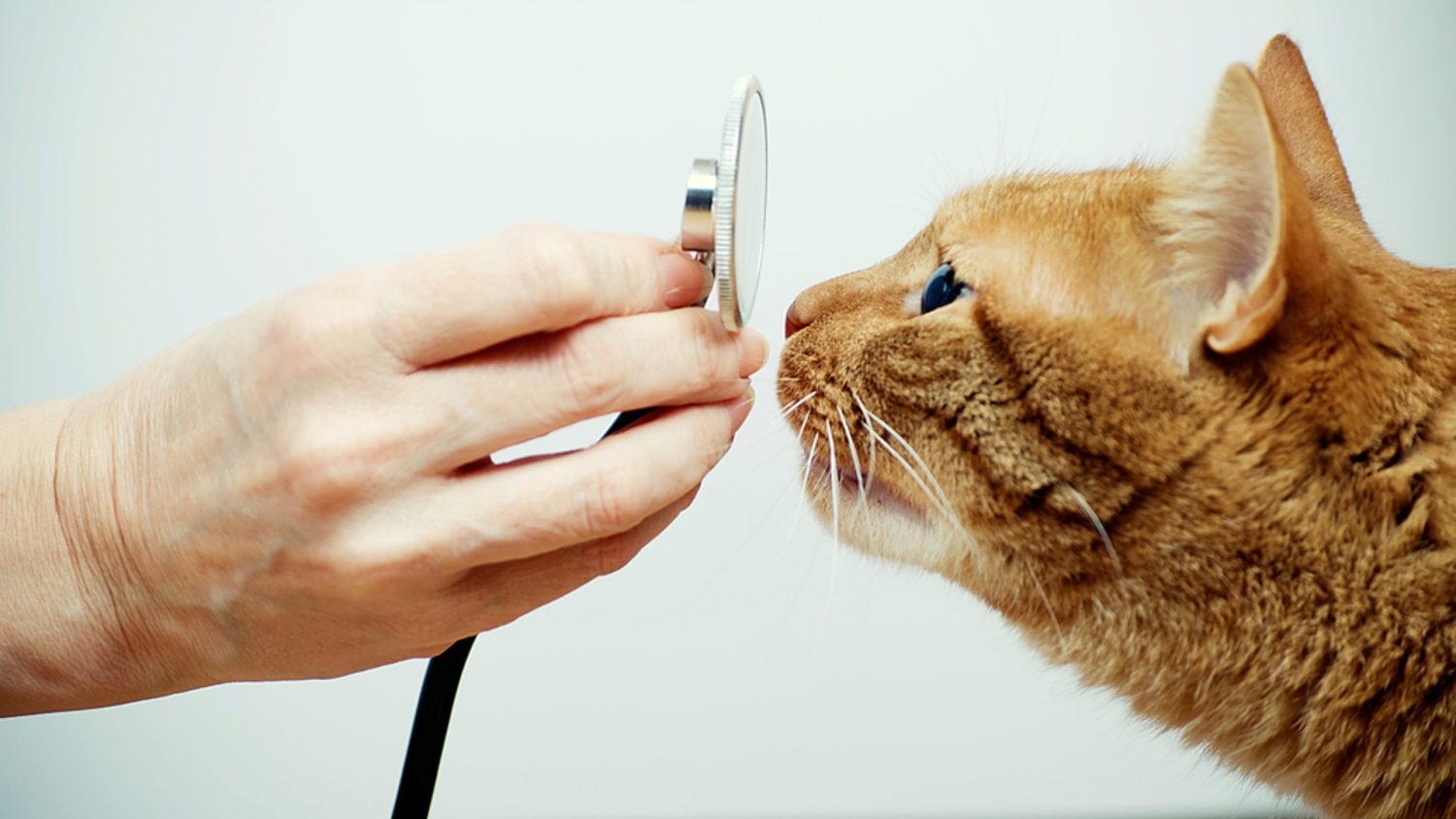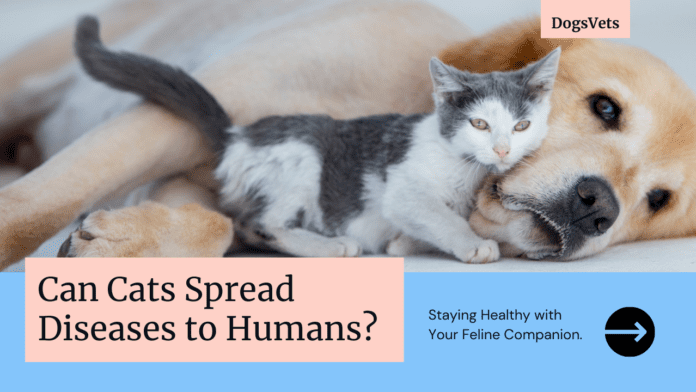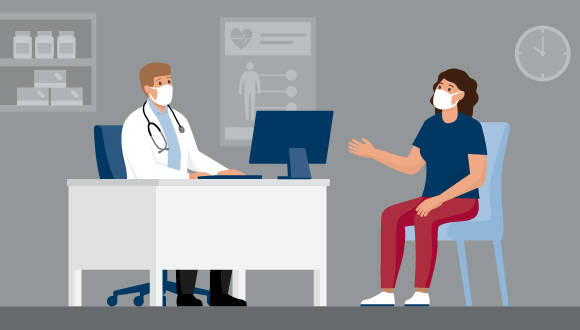Last Updated on April 18, 2024 by Dog Lover
Can Cats Pass Diseases to Humans? The Purrfect Guide to Staying Healthy with Your Feline Friend
Ever looked into your cat’s mesmerizing eyes and wondered, “Can cats actually give me diseases?”
Sharing your life with a feline companion is a joy, but it’s natural to have concerns about potential health risks.
Fear not, fellow cat lovers! While some diseases can jump between species (called zoonotic diseases), the risk is often low, and there are simple steps you can take to minimize it.
This comprehensive guide will shed light on zoonotic diseases transmissible from cats to humans, debunk some common myths, and equip you with tips for a healthy and harmonious life with your furry friend.

Building a Strong Foundation: Understanding Zoonotic Diseases
Zoonotic diseases are those that can be transmitted between animals and humans.
While the thought might be a little unsettling, it’s important to remember that most cat diseases are specific to felines and pose no threat to humans.
However, a small handful of zoonotic diseases can be contracted through contact with cats. These diseases are often caused by parasites, bacteria, or fungi that can thrive in both feline and human hosts.
The good news? The risk of getting sick from your cat is generally low, especially for healthy individuals.
Furthermore, with proper hygiene practices and preventive measures, you can significantly reduce the chances of transmission.

Unraveling the Mystery: Common Zoonotic Diseases from Cats
Now, let’s delve deeper into some of the most common zoonotic diseases spread by cats:
-
Toxoplasmosis: This parasitic infection can cause flu-like symptoms in healthy adults. However, it can be particularly dangerous for pregnant women, as it can potentially harm the developing fetus.
-
Cat Scratch Disease (CSD): This bacterial infection is caused by Bartonella henselae bacteria, typically transmitted through scratches or bites from infected cats. Symptoms include swollen lymph nodes, fever, and fatigue.
-
Ringworm: Contrary to its name, ringworm isn’t caused by worms but by a fungal infection. While not a serious condition, it can cause itchy, scaly patches on the skin.
-
Roundworms and Hookworms: These intestinal parasites can be passed from cats to humans, especially children, through contaminated feces.
-
Giardia: This microscopic parasite can cause diarrhea, cramps, and nausea. It spreads through contact with contaminated feces or water.
Weaving a Web of Safety: Preventive Measures for a Healthy Coexistence
Now that we’ve identified the potential health concerns, let’s explore practical steps to keep you and your feline friend healthy:
-
Maintain a Clean Litter Box: Scoop the litter box daily and wash it thoroughly with warm, soapy water once a week. This minimizes the chance of coming into contact with parasites or bacteria.
-
Wash Your Hands Frequently: This is especially important after handling your cat, cleaning the litter box, or gardening.
-
Schedule Regular Vet Checkups: Routine vet visits for your cat ensure early detection and treatment of any potential health issues that could pose a zoonotic risk.
-
Practice Good Hygiene Around Food: Don’t allow your cat to walk on food preparation surfaces or counters.
-
Keep Your Cat Indoors (if possible): Indoor cats are less likely to encounter parasites or other pathogens found outdoors.

Debunking Myths: Separating Fact from Fiction
When it comes to cats and diseases, there’s a lot of misinformation floating around. Let’s dispel some common myths:
-
Myth: Cats will always give you toxoplasmosis.
-
Fact: Healthy adults with a functioning immune system usually experience mild or no symptoms from toxoplasmosis.
-
Myth: All cat scratches lead to CSD.
-
Fact: The bacteria responsible for CSD isn’t present in all cats, and proper wound cleaning after a scratch minimizes the risk.
-
Myth: Sharing your bed with your cat is dangerous.
-
Fact: While there’s a slight chance of zoonotic transmission, the benefits of the human-animal bond often outweigh the minimal risks.

Strengthening the Bond: Fostering a Healthy Relationship with Your Cat
A healthy cat is a happy cat (and a less likely source of zoonotic transmission!). Here are some tips to keep your feline friend in tip-top shape:
-
Provide a Nutritious Diet: Consult your vet to determine the best food for your cat’s age and activity level.
-
Keep Your Cat Hydrated: Ensure your cat has access to fresh, clean water at all times.
-
Engage in Playtime: Regular exercise is essential for your cat’s physical and mental well-being.
-
Shower Your Cat with Love: Cats thrive on affection.

Living in Harmony: Addressing Concerns for Specific Populations
While the general risk of zoonotic diseases from cats is low, some individuals might have heightened concerns. Here’s a breakdown of specific situations:
-
Pregnant Women: Toxoplasmosis can be harmful to a developing fetus. If you’re pregnant, talk to your doctor about getting tested for toxoplasmosis before getting a cat. You can still enjoy feline companionship by practicing extra caution, like having someone else clean the litter box.
-
People with Weakened Immune Systems: Individuals with compromised immune systems due to HIV/AIDS, undergoing chemotherapy, or organ transplants are more susceptible to infections. Consult your doctor about keeping a cat and emphasize hygiene practices.
-
Children: Young children are more likely to come into contact with cat feces, putting them at higher risk for parasites like roundworms and hookworms. Closely supervise playtime with cats and ensure proper handwashing routines.
When to See a Doctor
It’s important to be aware of signs that might indicate you or your cat is unwell. Here’s when to seek medical attention:
-
For you: If you experience persistent flu-like symptoms, swollen lymph nodes, or unusual skin lesions after interacting with your cat, consult your doctor.
-
For your cat: Watch for signs like vomiting, diarrhea, weight loss, lethargy, or unusual coughing. These could indicate underlying health issues that might increase the risk of zoonotic transmission.

The Final Purr-fect Touch: Conclusion
Sharing your life with a cat can be an enriching and rewarding experience.
By understanding zoonotic diseases, practicing good hygiene, and maintaining a clean environment, you can minimize any potential health risks and create a safe and healthy haven for both you and your furry companion.
Remember, the human-animal bond offers numerous benefits, and with a little proactive care, you can ensure a purrfectly healthy relationship with your feline friend.
Frequently Asked Questions (FAQs)
Can I still get a cat if I’m allergic?
Absolutely! If you have mild allergies, consulting an allergist and exploring hypoallergenic cat breeds can help. There are also ways to manage allergies through medication and air purification.
Is declawing my cat necessary to prevent CSD?
Declawing is a painful procedure and not recommended solely for disease prevention. Proper nail trimming and providing scratching posts are effective alternatives.
What if my cat hunts and eats outdoor prey?
Outdoor cats are more prone to parasites. Consider keeping your cat indoors or building a secure outdoor enclosure to minimize exposure.
I’m worried about sharing my bed with my cat. Should I stop?
The decision is ultimately yours. While there’s a minimal risk of zoonotic transmission, the comfort and companionship benefits can outweigh the risks for most healthy individuals.
Where can I find more information about cat health and zoonotic diseases?
The Centers for Disease Control and Prevention (CDC) offers a wealth of information on their website https://www.cdc.gov/healthypets/pets/cats.html. You can also consult your veterinarian for personalized advice.
Verified Sources:
- Centers for Disease Control and Prevention: https://www.cdc.gov/healthypets/pets/cats.html
- American Veterinary Medical Association: https://www.avma.org/
- World Health Organization: https://www.who.int/


















